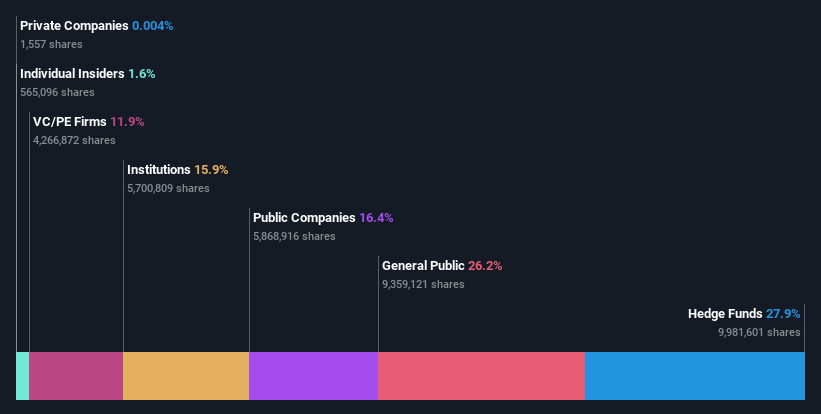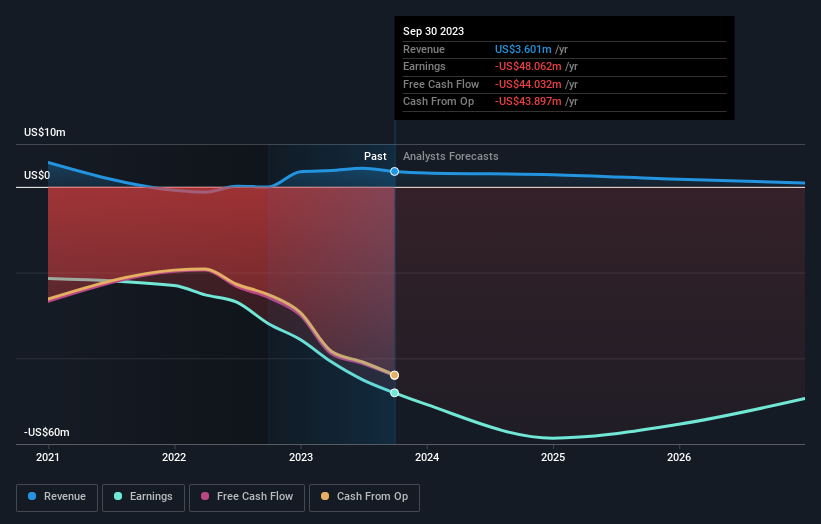Orchestra BioMed Holdings, Inc. (NASDAQ:OBIO) has caught the attention of hedge funds investors who hold a sizeable 28% stake
Key Insights
Institutions' substantial holdings in Orchestra BioMed Holdings implies that they have significant influence over the company's share price
51% of the business is held by the top 3 shareholders
Using data from analyst forecasts alongside ownership research, one can better assess the future performance of a company
Every investor in Orchestra BioMed Holdings, Inc. (NASDAQ:OBIO) should be aware of the most powerful shareholder groups. And the group that holds the biggest piece of the pie are hedge funds with 28% ownership. That is, the group stands to benefit the most if the stock rises (or lose the most if there is a downturn).
Because hedge funds owners have a huge pool of resources and liquidity, their investing decisions tend to carry a great deal of weight, especially with individual investors. Hence, having a considerable amount of institutional money invested in a company is often regarded as a desirable trait.
Let's delve deeper into each type of owner of Orchestra BioMed Holdings, beginning with the chart below.
See our latest analysis for Orchestra BioMed Holdings
What Does The Institutional Ownership Tell Us About Orchestra BioMed Holdings?
Many institutions measure their performance against an index that approximates the local market. So they usually pay more attention to companies that are included in major indices.
Orchestra BioMed Holdings already has institutions on the share registry. Indeed, they own a respectable stake in the company. This can indicate that the company has a certain degree of credibility in the investment community. However, it is best to be wary of relying on the supposed validation that comes with institutional investors. They too, get it wrong sometimes. When multiple institutions own a stock, there's always a risk that they are in a 'crowded trade'. When such a trade goes wrong, multiple parties may compete to sell stock fast. This risk is higher in a company without a history of growth. You can see Orchestra BioMed Holdings' historic earnings and revenue below, but keep in mind there's always more to the story.
Our data indicates that hedge funds own 28% of Orchestra BioMed Holdings. That worth noting, since hedge funds are often quite active investors, who may try to influence management. Many want to see value creation (and a higher share price) in the short term or medium term. Our data shows that RTW Investments, LP is the largest shareholder with 28% of shares outstanding. In comparison, the second and third largest shareholders hold about 16% and 6.8% of the stock. Furthermore, CEO David Hochman is the owner of 0.6% of the company's shares.
A more detailed study of the shareholder registry showed us that 3 of the top shareholders have a considerable amount of ownership in the company, via their 51% stake.
Researching institutional ownership is a good way to gauge and filter a stock's expected performance. The same can be achieved by studying analyst sentiments. There are plenty of analysts covering the stock, so it might be worth seeing what they are forecasting, too.
Insider Ownership Of Orchestra BioMed Holdings
The definition of company insiders can be subjective and does vary between jurisdictions. Our data reflects individual insiders, capturing board members at the very least. The company management answer to the board and the latter should represent the interests of shareholders. Notably, sometimes top-level managers are on the board themselves.
Insider ownership is positive when it signals leadership are thinking like the true owners of the company. However, high insider ownership can also give immense power to a small group within the company. This can be negative in some circumstances.
We can see that insiders own shares in Orchestra BioMed Holdings, Inc.. As individuals, the insiders collectively own US$5.0m worth of the US$314m company. This shows at least some alignment. You can click here to see if those insiders have been buying or selling.
General Public Ownership
The general public, who are usually individual investors, hold a 26% stake in Orchestra BioMed Holdings. This size of ownership, while considerable, may not be enough to change company policy if the decision is not in sync with other large shareholders.
Private Equity Ownership
With a stake of 12%, private equity firms could influence the Orchestra BioMed Holdings board. Some might like this, because private equity are sometimes activists who hold management accountable. But other times, private equity is selling out, having taking the company public.
Public Company Ownership
We can see that public companies hold 16% of the Orchestra BioMed Holdings shares on issue. This may be a strategic interest and the two companies may have related business interests. It could be that they have de-merged. This holding is probably worth investigating further.
Next Steps:
It's always worth thinking about the different groups who own shares in a company. But to understand Orchestra BioMed Holdings better, we need to consider many other factors. To that end, you should be aware of the 3 warning signs we've spotted with Orchestra BioMed Holdings .
Ultimately the future is most important. You can access this free report on analyst forecasts for the company.
NB: Figures in this article are calculated using data from the last twelve months, which refer to the 12-month period ending on the last date of the month the financial statement is dated. This may not be consistent with full year annual report figures.
Have feedback on this article? Concerned about the content? Get in touch with us directly. Alternatively, email editorial-team (at) simplywallst.com.
This article by Simply Wall St is general in nature. We provide commentary based on historical data and analyst forecasts only using an unbiased methodology and our articles are not intended to be financial advice. It does not constitute a recommendation to buy or sell any stock, and does not take account of your objectives, or your financial situation. We aim to bring you long-term focused analysis driven by fundamental data. Note that our analysis may not factor in the latest price-sensitive company announcements or qualitative material. Simply Wall St has no position in any stocks mentioned.


